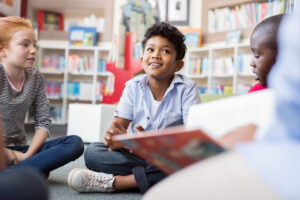Why these learning differences are gifts
Key takeaways:
- The right hemisphere of the brain is 10% larger in children with dyslexia
- The right brain controls creativity, empathy, emotion, and spatial recognition
- Children with ADHD tend to be more creative, energetic, and insightful
Our series on The Learning Lab’s core values concludes with a focus on “Attitude of Gratitude.” Motivating children to think beyond labels or what they see on the surface, is a powerful way to build self-esteem. While there are some challenges associated with dyslexia and ADHD, children with these learning differences are also blessed with amazing gifts and strengths.
We discuss some of the gifts of having dyslexia and ADHD. We explain how things that are sometimes given a negative connotation actually have several advantages. You’ll also see how famous people overcame their learning differences to build successful careers as inventors, business moguls, scientists, actors, musicians, and artists.
The gifts of dyslexia
The Learning Lab believes that our greatest struggles can become our biggest advantages! Dyslexia, for example, makes it harder for children to learn to read and write. Some also have trouble processing numbers. While this does make academics more challenging, people with dyslexia can possess several gifts. For instance, they tend to be very creative, energetic, and hardworking.
Why is this?
Children with dyslexia often have so-called “right-brain strengths.” The brain is made of up two hemispheres or halves. The left side helps control written and spoken language. Meanwhile, the right hemisphere is responsible for visual awareness, emotions, spatial perception, and facial recognition. People who are “right-brain dominant” tend to be creative and artistic.
Other characteristics of people with dyslexia include:
- Curious
- Empathetic
- Like working with others
- Good at puzzles
- Think logically
- Highly intuitive
- Enhanced ability to read people
- Exceptional music awareness
- Enhanced ability to interpret social cues
All of these gifts are associated with right-brain strengths or dominance. Since many children with dyslexia are right-brain dominant, they possess these skills. These strengths are thanks to the unique way their brains process stimuli, including language.
Brain differences in people with dyslexia
The brain’s two hemispheres are roughly equal in size but in a majority of people, the left side may be slightly larger. Research has uncovered, however, that in dyslexics, the right side is usually 10% larger. If you remember that the right hemisphere is where creativity and emotions reside, you can understand why dyslexics tend to be more creative and empathetic.
Famous people who have dyslexia
Around 14.5-43.5 million Americans have dyslexia. We now understand that dyslexia affects how people process language and numbers. It’s a learning difference that has nothing to do with intelligence.
Despite the challenges, dyslexia does not have to hold your child back. In fact, a number of famous and successful people have (or had) dyslexia. They include:
- Agatha Christie (mystery author)
- Tom Cruise (actor)
- Leonardo da Vinci (artist)
- Walt Disney (filmmaker)
- Albert Einstein (physicist)
- Whoopie Goldberg (actress)
- Tommy Hilfiger (designer)
- John Lennon (musician)
- Daniel Radcliff (actor)
- Thomas Jefferson (U.S. president)
- Pablo Picasso (artist)
- Octavia Spencer (actress)
- Steven Spielberg (director/producer)
- Andy Warhol (artist)
- George Washington (U.S. president)
These are just a few of the people who have gone on to great success, despite having dyslexia. That’s because dyslexia is a learning difference that doesn’t have to hold someone back. With early intervention, it can actually accelerate a person’s abilities.
The challenges of ADHD
Around 6.1 million children in the U.S. have been diagnosed with ADHD. Children with ADHD find it hard to concentrate or focus on tasks for very long. This can make sitting in a classroom or focusing on assignments very difficult.
Other characteristics of ADHD include:
- Unable to sit still
- Constant fidgeting
- Excessive physical movement
- Excessive talking
- Interrupts conversations
- Acts without considering consequences
- Daydreaming a lot
- Struggles with time management
- Trouble following directions
- Frequently loses things
All of these characteristics can make school and completing classwork much more of a challenge. It doesn’t have to be, though. As with dyslexia, those with ADHD have certain gifts and they can be harnessed for successful learning and living.
The gifts of ADHD
While the challenges of ADHD can certainly affect your child academically, he or she may be blessed with other natural gifts. The exuberance that often comes from ADHD could lead to incredible creativity. Like with dyslexia, children with ADHD have a great capacity for developing insights and awareness of the feelings and emotions of other people.
Gifts of ADHD include:
- Creativity
- Attunement to nature
- Intuition about other people
- Enthusiastic
- Emotional sensitivity
There have been numerous studies that point to the notion that people with ADHD achieve higher levels of creativity. One study found that “… real-life creative achievement is associated with the ability to broaden attention and have a “leaky” mental filter – something in which people with ADHD excel. That’s great news!
Famous people with ADHD
As with dyslexia, there are many famous and successful people who have ADHD. They haven’t let it stop them from becoming successful. They include:
- Simone Biles (Gold-medal winning gymnast)
- Richard Branson (businessman)
- Adam Levine (singer)
- Michael Phelps (Gold-medal winning swimmer)
- Will Smith (actor/singer)
- Justin Timberlake (singer)
- Carrie Underwood (singer)
- Emma Watson (actress)
It’s not completely understood why people with ADHD have the gifts of creativity and empathy. Many do tend to have them, though.
The Learning Lab: Building skills by identifying strengths
Children with dyslexia and ADHD are often misunderstood. They get labeled as “problem kids” who simply need to try harder to learn. Unfortunately, they don’t learn in the same way as other children. That doesn’t mean they can’t learn, however.
The Learning Lab focuses on delivering out-of-the-box solutions for out-of-the-box thinkers and learners. We focus on your child’s strengths and gifts, finding ways to help him or her learn and enhance reading, writing, and math skills. We offer individual and small group settings that are designed to meet your child’s unique needs. We also allow children to learn in ways and places that make them comfortable and ready to engage.
Academic software
We incorporate brain-based reading, writing, and math software into our programs, which are designed specifically for children with learning differences. These software programs focus on common issues facing children with dyslexia, dyscalculia, and ADHD. They help to build critical cognitive skills and academic skills including:
- Phonemic awareness
- Phonics
- Memory
- Attention/Focus
- Sequencing
- Processing
- Reading comprehension
- Reading fluency
- Grammar
- Semantics & mechanics
- Vocabulary
- Morphology (recognition, understanding & use of word parts)
- Abstract and concrete math concepts
These software programs are adaptive and intuitive to meet each child’s individual needs. When used in conjunction with our individualized instruction, the common deficits that many of our students are faced with can be successfully remediated. Our kids love to learn in a variety of ways!
I3 Lab
Our I3 Lab offers a customized experience for each child. We tailor a plan to fit your child’s strengths and learning style, whether he/she is a visual, auditory, or tactile learner. We craft individualized plans for kids using a time-tested, evidence-based curriculum.
Our programs include:
- Barton Reading and Spelling System©
- DreamBox Math©
- Fast ForWord®
- Foundation in SoundsTM
- Math Remediation
- Multi-Sensory Writing Instruction
- Reading Assistant PlusTM
- Wilson Just Words®
- Winston Grammar®
- Visualizing and Verbalizing Multi-Sensory Language-Based Programming®
- TouchMath©
- Institute for Excellence in Writing (IEW)
- Seeing Stars®
In the I3 Lab, we teach kids the way they learn. We offer one-on-one and small group instruction. Using a personalized intervention plan, we can help close skill gaps and build confidence, so your child can catch up with peers and succeed academically.
Get the help your child needs
If your child struggles academically because of learning differences such as dyslexia or ADHD, it’s important to get help as early as possible. The Learning Lab in Ft. Lauderdale and Davie offers support for children and teens who need help in reading, writing, and math. Our goal is to prepare your child for a lifetime of learning while helping him/her close academic gaps. Contact us today for more information.





